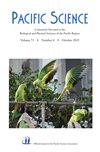夏威夷群岛考艾岛输电线路周围夏威夷海燕和纽厄尔剪切水(Aves:Procellariformes)的行为
IF 0.7
4区 生物学
Q4 MARINE & FRESHWATER BIOLOGY
引用次数: 0
摘要
摘要:了解输电线路、通信塔和风力涡轮机等高层建筑周围鸟类的行为,对于评估这些建筑对鸟类种群的潜在影响很重要;它对受威胁或濒危物种尤其重要。1992年至2002年,我们研究了主要在黄昏/夜间活动的夏威夷Petrel(Pterodroma sandwichensis)和主要在夜间活动的Newell’s(Townsend’s)Shearwater(Puffinus newelli;Aves:Procellariformes)对美国夏威夷考艾岛海岸和近海岸输电线路的响应。夏威夷Petrels对输电线路的响应频率(19.1%的时间;N=209)明显高于Newell’s Shearwaters(7.4%;N=392),并且,如果研究地点是黑暗的(即,没有来自附近城镇的环境光照明),无论天空是明亮的(即白天还是黄昏的光线条件)还是黑暗的(夜间光线条件),其反应的频率都明显低于明亮的(例如,由来自附近城市的环境光照亮)。相比之下,Newell’s Shearwaters的反应率几乎没有因距离或研究地点或天空是亮是暗而变化。夏威夷海燕主要通过改变飞行速度和飞行高度来对传输线做出反应,而纽厄尔海燕主要是通过改变飞行方向和飞行高度做出反应。夏威夷海燕的响应率和浮力比Newell’s Shearwaters更高,这可能有助于夏威夷海燕在考艾岛海岸和近海岸输电线路上的死亡率比Newell‘s Shearwaters更低。本文章由计算机程序翻译,如有差异,请以英文原文为准。
Behavior of Hawaiian Petrels and Newell's Shearwaters (Aves: Procellariiformes) Around Electrical-Transmission Lines on Kaua‘i Island, Hawaiian Islands
Abstract: Understanding the behavior of birds around tall structures such as electrical-transmission lines, communication towers, and wind turbines is important in assessing the potential effects of those structures on bird populations; it is especially important for threatened or endangered species. We studied responses of the mostly crepuscular/nocturnal Hawaiian Petrel (Pterodroma sandwichensis) and the mostly nocturnal Newell's (Townsend's) Shearwater (Puffinus newelli; Aves: Procellariiformes) to coastal and near-coastal transmission lines on Kaua‘i Island, Hawai‘i, USA, in 1992–2002. Hawaiian Petrels responded to transmission lines significantly more often (19.1% of the time; N = 209) than Newell’s Shearwaters did (7.4%; N = 392), responded significantly more often with decreasing distance from a line, and responded significantly less often if a study-site was dark (i.e., unlit by ambient lights from nearby towns) than if it was light (i.e., lit by ambient lights from nearby towns), regardless of whether the sky was light (i.e., daylight or crepuscular light conditions) or dark (nocturnal light conditions). In contrast, Newell’s Shearwaters showed little variation in response rates by distance or by whether the study-site or sky was light or dark. Hawaiian Petrels mostly responded to transmission lines by changing flight velocity and flight altitude, whereas Newell’s Shearwaters mostly responded by changing flight direction and flight altitude. The higher response rates and more-buoyant flight characteristics of Hawaiian Petrels than Newell’s Shearwaters may contribute to lower rates of fatality of Hawaiian Petrels than Newell’s Shearwaters at coastal and near-coastal transmission lines on Kaua‘i.
求助全文
通过发布文献求助,成功后即可免费获取论文全文。
去求助
来源期刊

Pacific Science
生物-动物学
CiteScore
1.40
自引率
14.30%
发文量
17
审稿时长
3 months
期刊介绍:
Pacific Science: A Quarterly Devoted to the Biological and Physical Sciences of the Pacific Region
The official journal of the Pacific Science Association. Appearing quarterly since 1947, Pacific Science is an international, multidisciplinary journal reporting research on the biological and physical sciences of the Pacific basin. It focuses on biogeography, ecology, evolution, geology and volcanology, oceanography, paleontology, and systematics. In addition to publishing original research, the journal features review articles providing a synthesis of current knowledge.
 求助内容:
求助内容: 应助结果提醒方式:
应助结果提醒方式:


